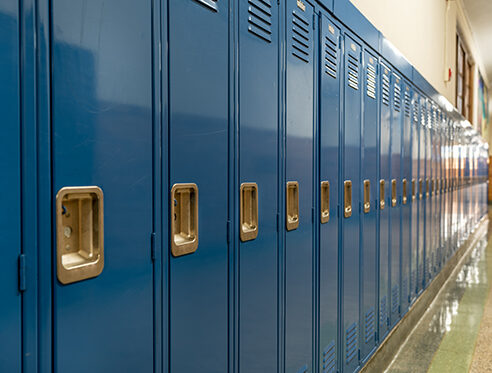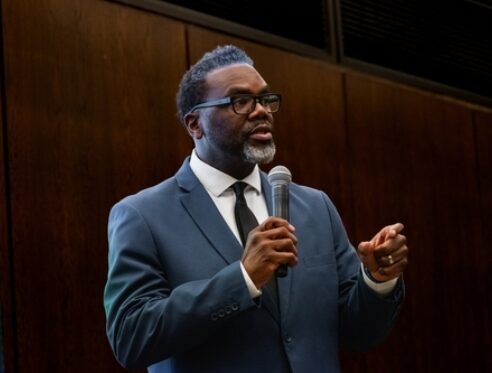State legislators have filed complementary bills in the House and Senate empowering the Chicago Board of Education to non-renew charter schools before the conclusion of Chicago’s January 2025 school closure moratorium.
Background: The law establishing Chicago's elected school board also contains a provision prohibiting “school closings, consolidations, and phase-outs” until the city's inaugural elected school board takes office on January 15, 2025.
The CPS board voted in October 2022 to revoke two campuses of Urban Prep Academy, but in June 2023, a Cook County judge ruled that the state moratorium applied to charter schools.
While the CPS board has not tried to close or non-renew any charters since the ruling, it has continued the trend toward shorter charter renewal term lengths that began under former Mayor Lori Lightfoot.
Why it Matters: Charter schools constitute a substantial portion of Chicago's education system.
- Over 51,000 CPS students attend charter schools, spread across 111 campuses — representing approximately one-sixth of all students and schools in CPS.
The scale of Chicago’s charter sector is comparable to the size of public school systems in Atlanta, San Francisco, and Washington, D.C.
- In the first six months of their term, the CPS board has subjected the city's charter schools, which are publicly funded but privately managed, to increased scrutiny.
In addition to granting shorter renewal terms, the CPS board’s December 2023 resolution vowed to “transition away” from non-neighborhood schools – including charter schools.
What They’re Saying: Not wanting to alienate a large part of Chicago’s electorate, Brandon Johnson mostly abstained from criticizing charters during his mayoral campaign and took pains to stress he did not oppose them.
Following public angst stemming from the CPS board’s December 2023 resolution, Mayor Johnson pledged not to close any magnet or selective enrollment schools during a recent interview with WBEZ/Sun-Times.
However, when pressed to provide similar assurances for charter schools, he avoided giving a direct answer, instead saying “charter schools educate a good number of our children…[but do] I believe in privatization? No.”
Chicago Board of Education President Jianan Shi and Vice President Elizabeth Todd-Breland have used similar language to publicly allay concerns and affirm their commitment to not close magnet or selective enrollment schools, but have conspicuously left charters out.
Zoom Out: In his prior role as an organizer for the Chicago Teachers Union (CTU), Mayor Johnson vehemently fought charter school expansion but worked to unionize charter staff.
Over the past decade, the relationship between charter school teachers and the Chicago Teachers Union (CTU) has become more intertwined, despite the CTU's longstanding opposition to charter schools.
The first Chicago charter school unionized 15 years ago. Since then, Chicago has led the nation in charter unionization, with CTU now representing educators and staff at 35 charter campuses — nearly one-third of all such schools.
Unionized or not, all certified teachers employed by charter schools pay into the Chicago Teachers Pension Fund (CTPF), just like their peers in neighborhood schools.
Reality Check: If CPS moves to close a charter school, the school can appeal to the Illinois State Board of Education (ISBE).
- If ISBE approves the appeal, the school will remain open under state oversight and receive more funding than what CPS previously provided.
These funds are siphoned away from the district’s state funding allocation.
- However, independence from CPS comes with significant operational challenges. The school effectively becomes a small, autonomous school district, taking on responsibilities such as transporting eligible special education students and operating its school facility without any CPS assistance.
Additionally, schools are removed from the district’s GoCPS platform, diminishing the school’s visibility.
What’s Next: It is unclear if the pending state legislation has the support of the Chicago Board of Education, the Mayor’s Office, CTU, or some combination of the three. For now, it’s just a bill.
It's also uncertain whether the bill would enable the revocation of Urban Prep's two campuses to proceed.
Charter renewals are typically voted on at the district's January Board meeting. If the bill becomes law, there is speculation as to whether the CPS board will change precedent and render charter renewal decisions before the January 2025 board meeting — as that meeting will usher in Chicago's inaugural elected school board.
And there are better opening acts for newly elected school board members than taking a tough vote on charter renewals, including possible closures.

And there are better opening acts for newly elected school board members than taking a tough vote on charter renewals, including possible closures.



